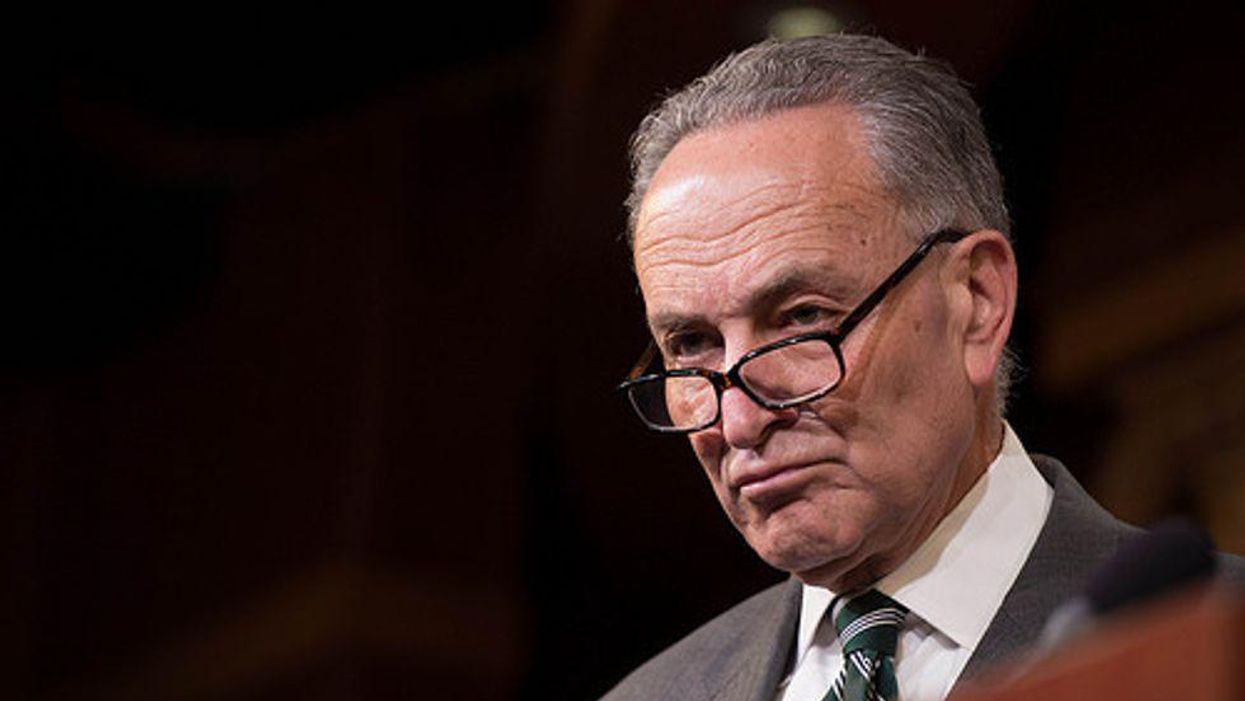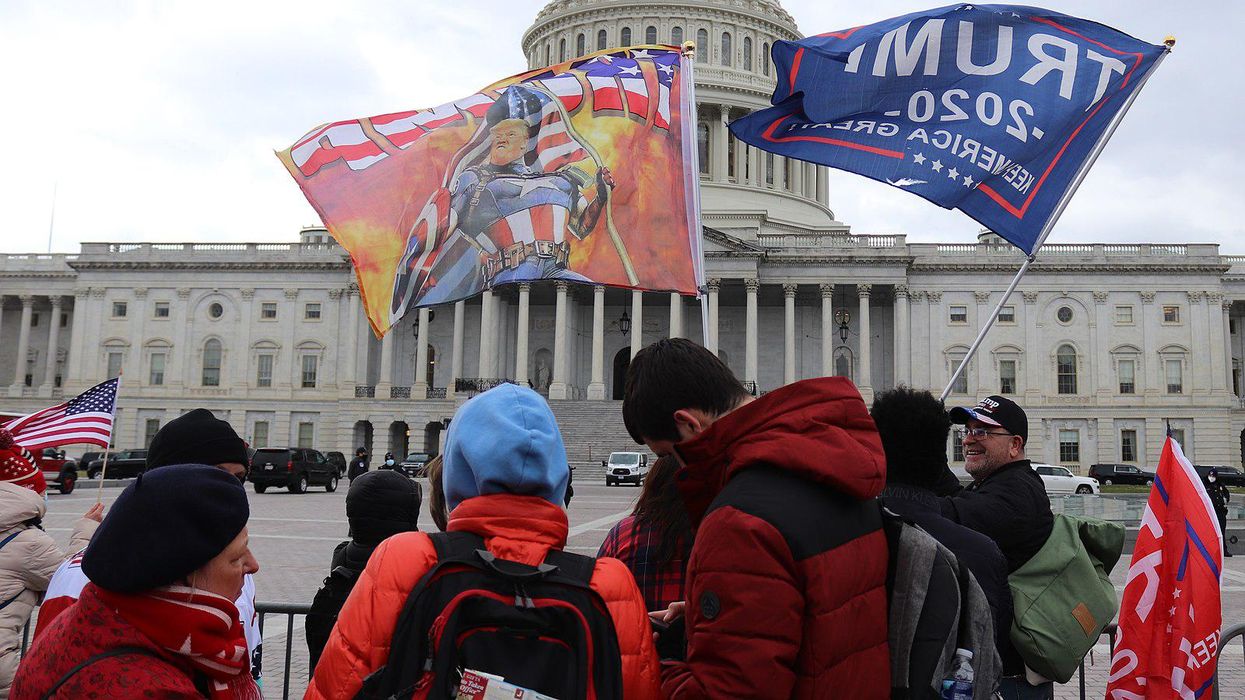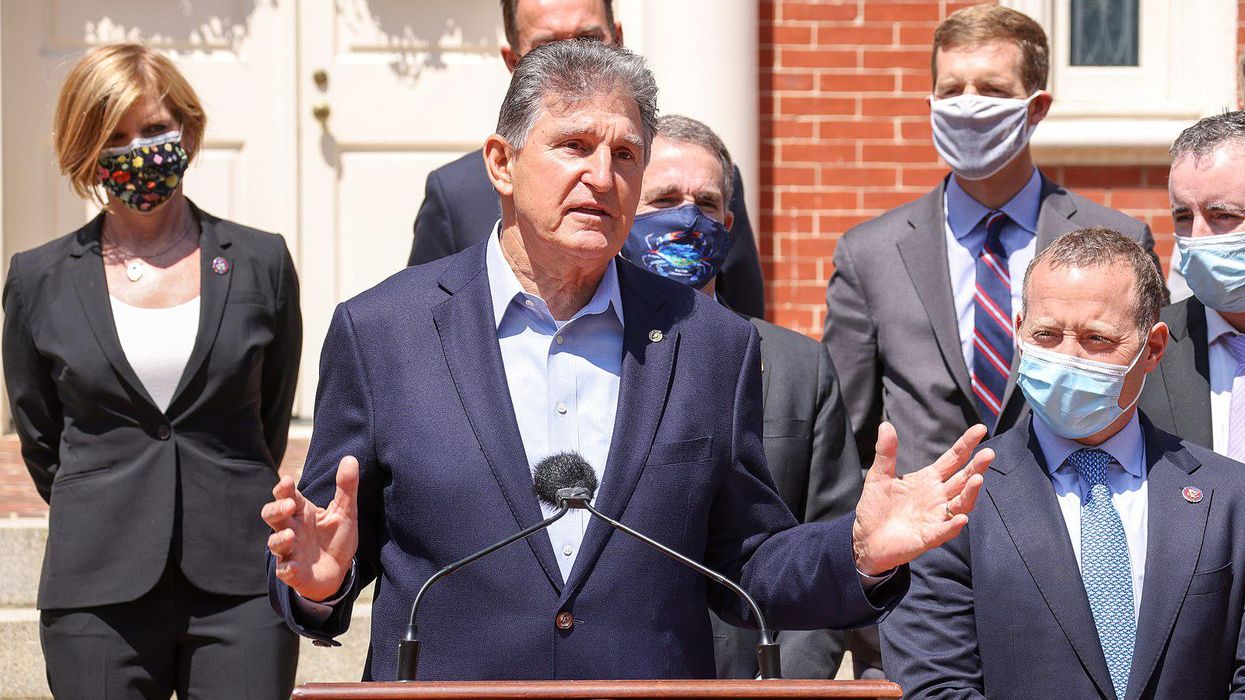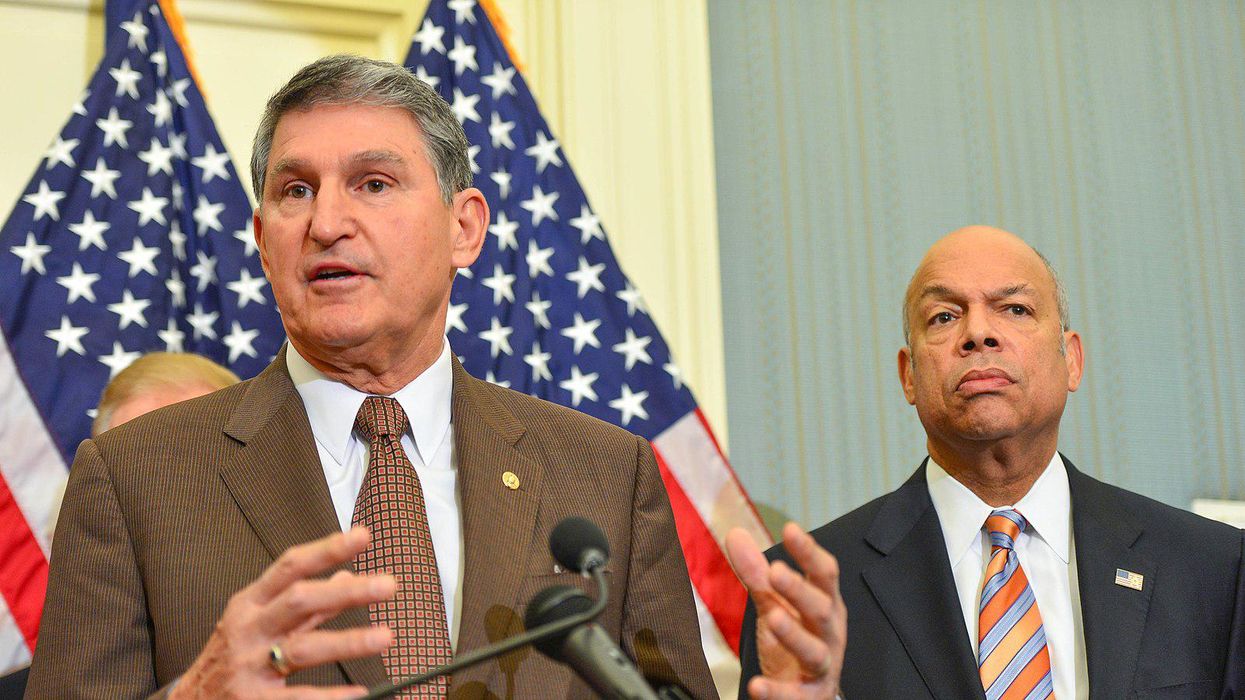GOP Senators Block Election Reform -- As States Erode Democracy
For now, Senate Republicans have blocked sweeping election reform. They argued that America's elections are not in crisis and are best run by rules set by states. Meanwhile, in capitals across battleground states, numerous Republican legislators have been claiming elections face numerous threats and have passed dozens of laws, the most aggressive of which curtail voting options, newly police the process, and empower party loyalists at post-Election Day counting stages.
"The Republican leader flatly stated that no matter what the states do to undermine our democracy—voter suppression laws, phony 'audits,' or partisan takeovers of local election boards—the Senate should not act," said Sen. Chuck Schumer, Democrat of New York, and majority leader, referring to Kentucky's Sen. Mitch McConnell and a Republican filibuster that blocked the election reform bill.
"Republican state legislatures across the country are engaged in the most sweeping voter suppression in 80 years," Schumer said. "Capitalizing on, and catalyzed by, Donald Trump's big lie [that he won in 2020], these state governments are making it harder for younger, poorer, urban and non-white Americans to vote."
The deepening divide over voting in America is larger than the For the People Act, the Democrat-sponsored bill that addresses presidential ethics, campaign finance, partisan redistricting and voting rights. Both major parties are vying to change who votes in America and how they cast ballots. Republicans often are seeking a more limited franchise. Democrats are seeking the opposite.
In the Senate on June 22, the GOP argument often reverted to states' rights, which had permitted a litany of voting rights abuses and violence for decades until the passage of strong federal civil and voting rights laws in the 1960s.
"You are imposing a federal mandate and a one-size-fits-all approach that just might not fit well," said Sen. Lisa Murkowski, Republican of Alaska, in a speech opposing the reform bill. "We don't know everything best back here [in Washington]."
Voting rights battles are not new, but new ground is being broken in 2021. Seen nationally, Republicans, whose base is aging and shrinking, have been raising the bar for access to a ballot and seeking to segregate voters by party for much of the 21st century. This is especially true in increasingly purple states where the party holds gerrymander-created legislative majorities and dominates the courts.
Democrats, in turn, have been left in more defensive postures where they have railed against the immorality of complicating the process for voters, which can suppress turnout; have sued to blunt new laws that can impede voters; and have worked to increase voter turnout, especially in high-profile contests. On balance, Republicans have been more proactive, and Democrats' responses have been less effective, leaving Republicans with the upper hand in shaping America's strictest voting rules.
That dynamic and history led to congressional Democrats teeing up a massive reform bill comprised of proposals that have languished for years. It also gave congressional Republicans a single target. As GOP senators attacked a handful of progressive voting rights reforms in the For the People Act, they drew upon a strategy that has long been part of their party's "election integrity" messaging.
They criticized the bill's loosening of strict voter ID rules, creating public financing for candidates, and so-called ballot harvesting, the GOP's term for activists and party workers who provide assistance to voters by collecting ballots mailed to and filled out by voters and delivering them to election offices. Senate Republicans recited these objections as talking points and more broadly defended states' rights, despite Democrats' rebuttals that the senators were reviving last century's segregationist arguments.
"Republican leaders say that they like this rigged system… taking us back to the racist efforts that existed before the 1965 Voting Rights Act," said Sen. Jeff Merkley, Democrat of Oregon, in one such floor speech. "A violent mob storming the Capitol isn't the only way to attack Democracy."
A Widening Attack On American Democracy
It would be a mistake to characterize the Senate gridlock as just another phase in America's endless partisan battles. Starting in Trump's presidency, many Republicans have widened this playbook to not just attack expanded access to voting but now also to target election administrators and voting systems. That development, whose rhetoric is filled with false claims about stolen votes, is serious because it rattles several foundations of American democracy.
American elections have largely relied on the good faith of election officials. In most cases, these civil servants place public service and overseeing a reputable process before personal and partisan gain. But many career election officials are leaving the field due to the partisan attacks and threats of violence that followed the 2020 election. In addition, the conspiratorial thinking has led many supporters of Trump to believe that the 2020 election is not over. No finality in elections, in turn, delegitimizes representative government and the ability to govern.
"We are watching, once again, the devolution of democracy in the United States," said Stacey Abrams, one of the Democratic Party's foremost voting rights activists, speaking on a June 22 Zoom briefing to promote her new book, Our Time Is Now: Power, Purpose, and the Fight for a Fair America.
But the problems facing American democracy are bigger than Trump, she said.
"Yes, there's a guy who wanted to win, and he didn't win, and he told a big lie, and there are those who use him as their proxy," Abrams said. "But let's be clear, their [Trump supporters'] anger is about who made the choice; their anger is about who showed up to vote—who did not vote before. Because of COVID-19, we saw… a confrontation with voter suppression the likes of which we have not seen in a generation in the United States. Because of that [response], 50 million people voted by mail because it was too dangerous to go outside."
In election administration circles, the pandemic was historically disruptive. Once 2020's primaries resumed, many states struggled to accommodate voters due to health precautions, poll worker shortages and last-minute logistical challenges. By the fall's general election, however, public officials made extraordinary efforts to offer more options for voters to get a ballot and ways to cast it.
According to the U.S. Elections Project, which tracks voter turnout, 56 million people voted in a different manner in the 2020 presidential election than they had in the 2016 presidential election. Many Republicans in the U.S. Senate and in state legislatures have said the expanded voting options were not normal and must be reeled in (despite the fact that many Republican candidates won 2020 state and federal races).
But Trump's stolen election rhetoric has not just endured in right-wing circles. It has led many red-run states to pass new laws to make voting harder, targeting the early and mail options that Democrats embraced in the 2020 election. And in some states, legislators expanded the power of their party's observers and curtailed the authority of local officials to maintain order during the final vote-counting phase. Simply put, the GOP attack on voting has widened its targets.
"And so we are watching as, state by state, the insurrection that we saw happen on January 6 takes root in our state governments, and state by state, we are watching anti-voter legislation putting up new barriers or tearing down access," Abrams said. "We are watching additional harms being put in place to challenge election workers—people whose only job is to make the administration of elections work. They are being attacked. They are being criminalized. We are watching the subversion of democracy through legislation."
These anti-voting trends can be seen in 10 states that tend to have a large impact on national politics, said Abrams, citing Texas, Georgia, Florida, Arizona, Iowa, Ohio, Pennsylvania, Michigan, Kansas and Oklahoma. "We've had more than 22 states in this year alone adopt more restrictive language," she said.
Post-2020 Impacts Coming Into View
Like all political decisions, new legislation can have unforeseen or overlooked consequences once the white-hot debates subside and laws are implemented.
That dynamic can be seen in Georgia, for example, where Republicans are using little-noticed language from bills passed earlier this year to remove Democrats from county boards of election.
These unseated officials—who, in Georgia, include several Black women who have spent years learning the details of running elections—decide on matters such as weekend polling place hours, ballot drop box locations and other details that affect whether voting is easier or harder. This is an attack on voters by targeting the referees of the process, whereas previously, bipartisan election administration lent credibility and legitimacy to the election outcomes.
A related under-the-radar dynamic has been simmering in Arizona, where the state Senate Republicans have sanctioned a post-election review of ballots from Maricopa County, home to Phoenix and 60 percent of the statewide electorate. In recent weeks, Voting Booth has reported on the accuracy-related shortcomings of that exercise, especially its hand count of 2.1 million ballots.
A June 22 report co-authored by Trey Grayson, a Republican and Kentucky's former secretary of state, and Barry Burden, a University of Wisconsin political scientist, affirmed these observations, saying the Arizona Senate review was run by "inexperienced, unqualified" private firms that are "ill-equipped to conduct it successfully and produce meaningful findings."
But the hundreds of paid workers—mostly middle-aged and older Maricopa County voters who supported Trump—employed in the Arizona state Senate's inquiry think that they are taking part in a process that is patriotic and saving American democracy, as Voting Booth has repeatedly been told in interviews while reporting from Phoenix.
But election auditors have challenged this assumption, pointing out that the Senate review's contractors have not performed crucial comparisons of the hand count of ballots against the building blocks of the official results, which would be essential to the meaningfulness of the inquiry. Moreover, many of these workers are suspicious of the voting process and distrustful of election officials. One hand-count employee was overheard saying, "I hope they are fake ballots, because there are so many [for] Biden."
While it is unclear what kind of report or claims will emerge from the Arizona Senate's review, it is not expected to be anything like a June 23 report by the Michigan Senate Oversight Committee, a Republican-led body, that inventoried and debunked the stolen election accusations made in that state. Nor is anything produced by the Arizona Senate's contractors expected to put doubts about 2020 to rest.
"If the election lives on forever, and the doubt in the electorate grows, the whole institution of election administration is undermined, and the norms that are associated with that [institution] are undermined," said Larry Moore, the retired CEO of Clear Ballot, an election auditing firm, and critic of the Arizona review.
"If you keep discussing [the process] as though you'll end up with a different outcome, you rob the government—the people who won—with the ability to govern. And that is so incredibly corrosive."
Steven Rosenfeld is the editor and chief correspondent of Voting Booth, a project of the Independent Media Institute. He has reported for National Public Radio, Marketplace, and Christian Science Monitor Radio, as well as a wide range of progressive publications including Salon, AlterNet, the American Prospect, and many others.
This article was produced by Voting Booth, a project of the Independent Media Institute.












